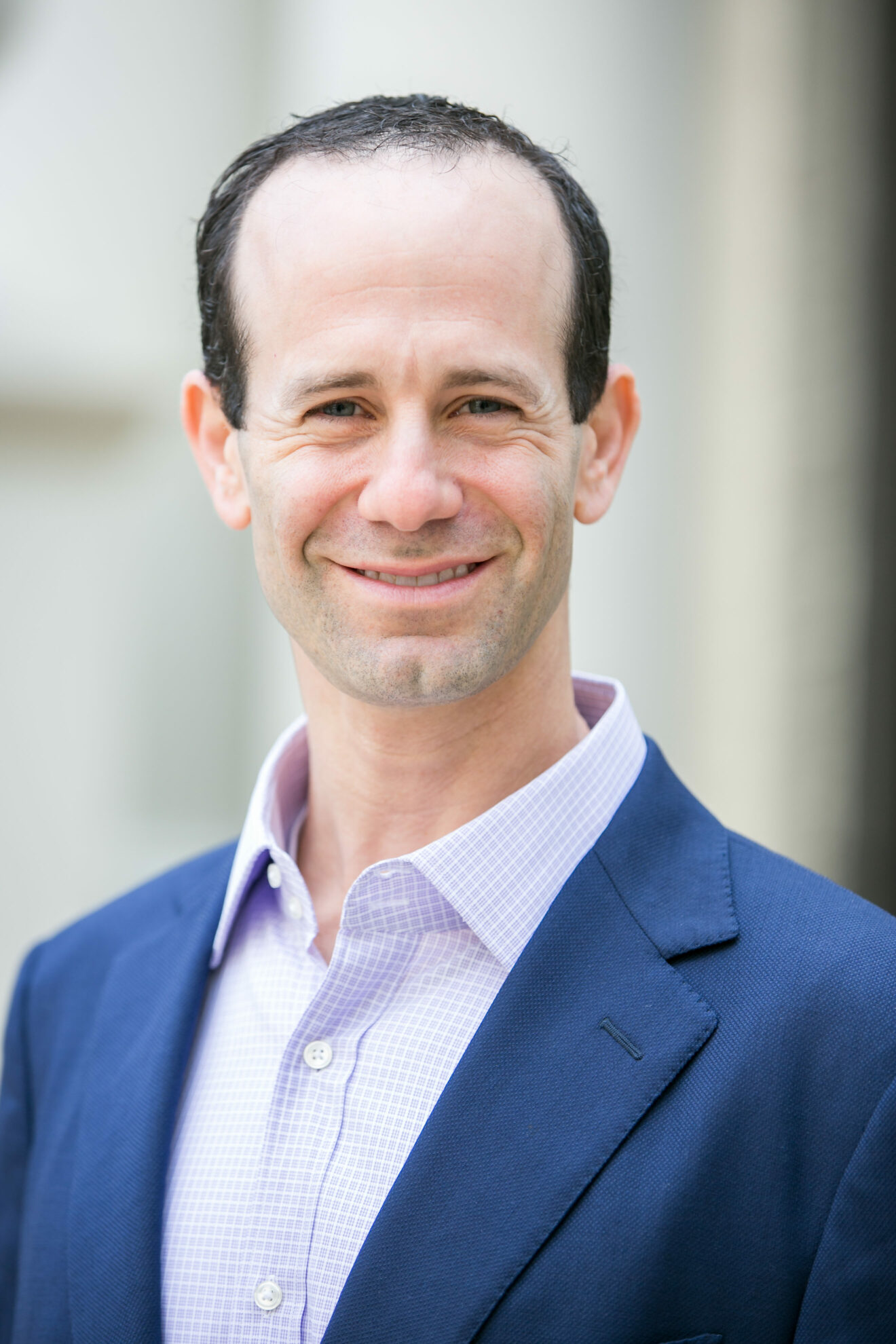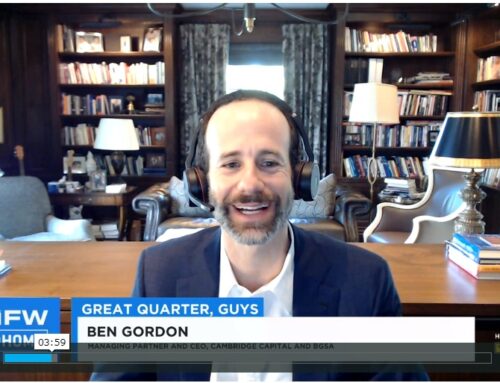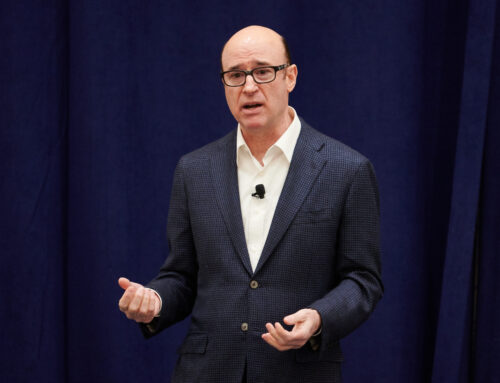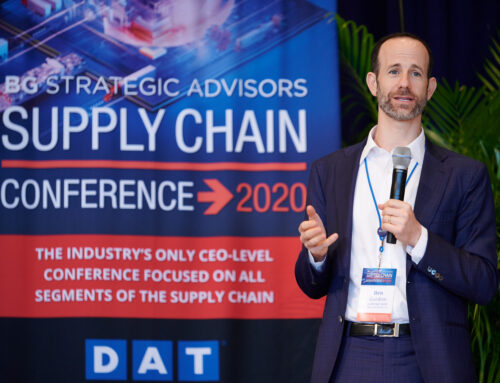“It’s important to be a great listener! In the beginning, I thought I had the answers. I remember holding an employee meeting, and feeling good about answering every question that came up. Later, I realized that I had probably talked too much. Sometimes it’s better to let others talk; to think about the answer; and to wait until the end before talking. I wish I had learned that skill sooner (and better).”
Interview of Benjamin Gordon by Carly Martignetti
I had the pleasure to interview Benjamin Gordon. Benjamin has founded four companies over the course of his career. In 1999, while still in Harvard Business School, Benjamin founded his first company, 3Plex. At 3Plex, Benjamin built one of the first Internet-based transportation management systems (TMS) companies. At Harvard, Benjamin and 3Plex were finalists in the HBS Business Plan Competition. Thereafter, he raised $28 million, built a team of over 200 people, and earned recognition in major media including the New York Times, Business Week, and ABC. Benjamin and the 3Plex team sold the company to Maersk in 2002.
In 2002, Benjamin started BG Strategic Advisors (BGSA), an investment banking firm focused on transportation and logistics. BGSA services included M&A, capital raising, and other strategic advisory services. BGSA became the go-to firm for a wide range of companies in the supply chain sector. Clients included NFI, UPS, GENCO, DHL, Agility Logistics, New Breed, Agility Logistics, and others. BGSA was particularly well-known for its work helping entrepreneurs to maximize their value through a sale process. Sell-side clients included Wilpak, Converge, Dixie, Raytrans, OpenMile, and others.
In 2009, Benjamin decided to form another supply chain technology company. He founded EcoSquid, an ecommerce marketplace enabling consumers to remarket or recycle their used mobility devices. Benjamin sponsored a field story at HBS, and again won a finalist award in the HBS Business Plan Competition. Benjamin sold EcoSquid to uSell in 2012.
Around the same time, Benjamin made the decision to launch his private equity and investment firm, Cambridge Capital. The mandate for Cambridge Capital is to invest in high-quality, high-growth companies in the supply chain sector. Cambridge focuses on businesses that are entrepreneur-led, leaders in a niche, and seeking more than just money. Cambridge has assembled a team of former CEOs and business leaders of major supply chain companies, who serve as Partners or Operating Partners. This team includes the former leaders of firms or divisions at UPS, FedEx Supply Chain, GENCO, Kuehne & Nagel, JDA Software, and others. Cambridge has invested in companies including XPO, Grand Junction (now Target), Bringg, and others.
This interview was originally published here.
Q: Benjamin, hank you so much for joining us for this interview! Can you tell us the story about what brought you to this specific career path?
I grew up in the transportation industry. My grandfather, Eugene Ribakoff, founded a truck leasing and car dealership business in 1948. His grandfather started a horse-and-buggy business called Morgenstern Express in 1903. So you could say logistics was in my genes.
When I graduated from Yale, I went into strategy consulting at CDI (now a part of Oliver Wyman). I began as a generalist. I discovered that I could make a bigger impact if I carved out a niche area of focus. Since I already knew about transportation, I decided to start there.
One of my first clients was a transportation company called XTRA Trailer Leasing. I spent close to a year working with them on their growth strategy. One area of opportunity I identified was third-party logistics. At the time, the 3PL market was still early in its development. XTRA did not end up moving into the 3PL arena, and instead chose to sell to Berkshire Hathaway. Having invested the time to develop a point of view on this new logistics and technology model, I decided it was an exciting opportunity to pursue.
Two years later, while I was at Harvard Business School, I noticed that other fragmented industries were spawning ecommerce startups. Two years before me, David Perry had started a company called Chemdex, automating the chemical sector. I thought, “Why not transportation?” And a month later, my classmate and co-founder Tania Yannas and I started 3Plex.
We worked very hard to get the business off the ground. It was difficult, because we were simultaneously trying to do several things: write the business plan, recruit employees, pitch customers, raise money, launch the product… and also stay in school! We both came close to getting kicked out for missing too many classes. In the end, it worked out. We managed to graduate. We were also lucky enough to win the finalist award for the HBS New Venture Competition. And Harvard Business Review wrote a case about our HR strategy. The irony is that we made a lot of mistakes in our HR strategy (and elsewhere). But that’s a topic for another case.
We raised three rounds of capital at 3Plex. As the business grew, our roles evolved. Eventually it was time to exit. Maersk acquired the business in 2002.
As I reflected on 3Plex, I realized that I had gotten to know many CEOs in the logistics sector. Some of them were interested in our software, but more of them seemed interested in my advice. So I listened to my customers and decided to start an advisory business.
From 2002 to 2009, I focused exclusively on building BG Strategic Advisors into the best investment bank possible for the logistics and supply chain arena. We worked with outstanding companies all around the world. I spent a year commuting to Kuwait to work with Agility Logistics on their growth strategy and three acquisitions in Asia and the US. We would later work in China with YRC Worldwide, helping them to divest their Chinese freight forwarder. And we worked on many deals in North America, including private equity clients (Pharos Equity, GTCR), large corporations (UPS, DHL), mid-sized niche leaders (GENCO, NFI, New Breed), and high-growth entrepreneur-owned and led businesses (OpenMile, Raytrans, others).
Through my work at BGSA, I saw one particularly compelling niche in reverse logistics. GENCO had built a powerhouse in this arena, and would eventually attract FedEx as its acquiror. Why was nobody building a reverse logistics business in the consumer arena? So I wrote a business plan for EcoSquid, a marketplace focused on reverse logistics. At EcoSquid, consumers could resell or recycle their used laptops, cell phones, and electronics. I went back to HBS, sponsored a field study, and put a team together. We again won the Finalist award in the HBS New Venture Competition, but this time we built the company without venture capital. By 2012, we had drawn the interest of a public buyer called uSell, and we sold the company.
EcoSquid was effectively my first deal as a venture capital/private equity investor. I decided to go ahead and build an investment business. That was the beginning of Cambridge Capital.
At Cambridge Capital, we decided to focus on transportation, logistics, and supply chain technology. This made sense, as a natural extension of the prior decade of businesses we had built. Another key decision was to build out the team and start investing prior to raising a fund. I knew it would cost me more money in the short run, but I also believed it would enable us to build a track record. So we started with a team of Operating Partners. Over time, that team grew to include the former heads of Kuehne & Nagel’s LeadLogistics business, GENCO, FedEx Supply Chain, the UPS Strategic Enterprise Fund, and others. In addition, we built out a team of investment professionals.
With this team and strategy in place, we started to invest. We started small, with deals like EcoSquid. Over time, we expanded. Subsequent investments included XPO (now a $10B+ public company), Grand Junction (subsequently sold to Target), Bringg, and others.
Today, I am proud of our team and capabilities. With our annual BGSA Supply Chain conference, we can assemble over 250 of the leaders in our industry, and create a network effect for our companies. I believe Cambridge Capital is well on the way to becoming the first choice for entrepreneurs in the supply chain sector who are seeking not just capital, but also value-added help. We can give CEOs the ability to gain access to customers, senior talent, strategic feedback, and acquisitions. Hopefully we will continue to build and grow on this basis.
Q: Can you share one of the major challenges you encountered when first leading a company? What lesson did you learn from that?
One of my first major challenges was at 3Plex. We sought to build what you would today call a software-as-a-service (SaaS) transportation management system (TMS). Essentially this was an operating system to help logistics companies run their business. This was a big undertaking.
We had two colleagues who wanted to pursue other product ideas.
One was a combinatoric engine that would enable companies to bid on bundles of lanes. If you were a shipper, you would bid on not just one lane (e.g. Dallas to New York), but also subsequent lanes (e.g. New York to Chicago, Chicago to Atlanta, and Atlanta to Dallas). The idea was that trucking companies would accept a lower payment in exchange for a continuous move.
The other idea was a drayage system that would allow shipping companies to communicate electronically with their short-haul trucking partners. This was a smaller market, but one that was inefficient and low on technology. Steamship companies could verify when their carriers arrived, and in turn carriers could ensure they got paid for detention and demurrage fees.
The problem was that three products was too many for a startup. We were simultaneously trying to build the TMS, the combinatoric engine, and the drayage system. My mistake was allowing all three to continue at the same time, which was very expensive. We ended up spending close to $28 million on these three fronts.
Ironically, the drayage system was the cheapest, and also proved to be the most valuable. It was the reason for Maersk’s interest. And it led to the sale.
The lesson for me was to keep things simple. As Jim Collins says, “fire bullets first, and cannonballs second.” It was ok to try three different products. With a small investment of time and money, that meant firing three bullets. The mistake was to keep investing heavily in all three areas. We could not have afforded to fire three cannonballs.
When it was time to build subsequent companies, I kept that lesson in mind, and tried to keep things simple and more focused.
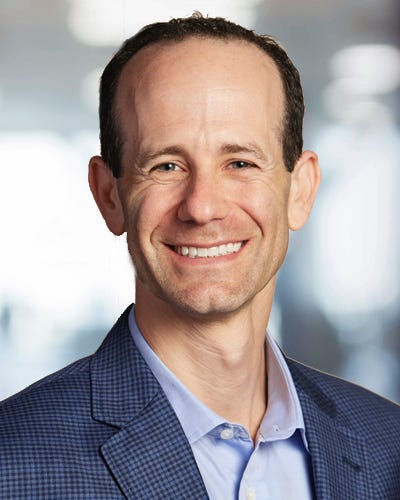
Q: What are some of the factors that you believe led to your eventual success?
I am a big believer in speed to output. When I have a meeting, I write down my takeaways and next steps. And then, within 24 hours, I strive to do them. This generates several benefits.
First, I’ve found that I’m always most effective when I’m acting on something that is fresh in my mind.
Second, little wins lead to big wins. When you achieve something small, it creates momentum, and the flywheel starts turning.
Third, quick followup sends a message. Colleagues and counterparts see that you mean business, that you do what you say, and that they can count on you. That creates a virtuous cycle.
I believe speed to output has been a key attribute in the success of my companies and initiatives.
Q: What are your “5 Things I Wish Someone Told Me Before I Became CEO”? Please share a story or example for each.
First — it’s hard work! I remember in my first year at 3Plex. I would work from 6am until 10pm. Then I’d go out for a quick dinner with my girlfriend (now wife). Once, I remember she asked me, “Now that you have 200 employees, can’t you work less?” The answer, as every entrepreneur knows, is not yet! In some respects, I felt a responsibility to do more, and not less, because I wanted to set an example. Also, the people you recruit typically take responsibility for a functional area, like sales or engineering. As founder and CEO, you still have to do everything else. When a company scales, perhaps that changes, but the responsibilities increase, and not vice-versa.
Second — it’s important to be a great listener! In the beginning, I thought I had the answers. I remember holding an employee meeting, and feeling good about answering every question that came up. Later, I realized that I had probably talked too much. Sometimes it’s better to let others talk; to think about the answer; and to wait until the end before talking. I wish I had learned that skill sooner (and better).
Third — it is tempting to chase too many goals at once. Don’t do it. I shared with you the mistakes I made at 3Plex pursuing three different products. The lesson is to focus on what matters most, and to not get distracted.
Fourth — how exactly do you focus? A good rule of thumb is “wide mouth, narrow neck.” This is a mantra in the world of product development, but it also makes sense in business more broadly. This means you should look at a lot of ideas, but then quickly narrow them to the ones that make sense. At Cambridge Capital, this year we spent a tremendous amount of time on three deals that we ended up not doing. I think we were right to explore all of them. In the end, they all didn’t make sense for different reasons. One was a CEO integrity question. Another was a customer concentration problem. And a third was a misalignment of goals with the owner. I think we make the right decision in all three situations. However, I wish we could have made that decision more quickly.
Fifth — positive attitude matters. A colleague told me that when I’m positive, it radiates to others, but when I’m negative, it infects others. I was taken aback when I first heard that feedback. But upon reflection, I realized it was true. As a leader, it’s important to set a positive example, even when things are going badly. It’s when times are tough that you make the biggest difference.
Q: What advice would you give to your colleagues to help them to thrive and not “burn out”?
I have a point of view on this that might be different from the conventional wisdom.
Many people say that you need to have “balance.” And if you lack balance, you could “burn out.”
I actually believe the opposite. To me, the goal isn’t balance. After all, balance implies an equal weighting of different activities. But those activities aren’t equally important, right? Why should you put as much weight on something that isn’t as important to you?
Instead, I think the goal is to live in accordance with your priorities. If your #1 priority is building a great company, then why not spend the majority of your time doing that? Of course, if your #1 priority was raising your children, then you should spend the majority of your time on that priority instead. Or if your #1 priority was to pursue philanthropic goals, or community objectives, or other purposes, then go for it! My point isn’t to tell you what to do, but to encourage you to make sure your time, energy, and resources match your priorities.
When you know you are matching your energy to your goals, then you feel great, and you do well.
Q: None of us are able to achieve success without some help along the way. Is there a particular person who you are grateful towards who helped get you to where you are? Can you share a story?
One of my mentors is my grandfather. He was someone who had accomplished a tremendous amount. He built a successful business, called AMI. He ran a vital non-profit, the JDC. And he was the rock of our family. He had exceptionally high standards, and I always strove to meet or exceed them.
One evening, he sat down with me and told me something I didn’t expect. “Don’t be so hard on yourself!” He knew that I was my own biggest critic, and that I drove myself to work as hard as possible. I didn’t need someone else to add to that responsibility. My grandfather explained that, because he knew how seriously I took my commitments, he never worried that I wouldn’t succeed. Instead, he worried that I would bear too much of the weight. He encouraged me to relax, to reflect, and to make sure to enjoy myself in midst of all the intensity.
This was a terrific lesson for me. It helped me to know when to dial it back. It didn’t change my work ethic and drive, but it did enable me to learn to develop a different gear.
Q: What are some of the goals you still have and are working to accomplish, both personally and professionally?
My #1 goal is to be considered the top partner for any entrepreneur in the supply chain sector who is seeking not just money, but also advice, expertise, and value-add.
I am seeking to achieve this goal in a few ways.
First, I am working to help my current portfolio companies to achieve more. I seek to help them with recruiting, access to customers, strategic feedback, and acquisitions. As a result, I am doing my best to ensure they maximize their potential.
Second, I am expanding our team, to continue to add talented leaders who can help our companies. Bringing on CEOs who have built major companies in all areas of transportation, logistics, and supply chain technology is important. It means we can provide more resources to help.
Third, I am continually seeking to learn more. How is the supply chain sector evolving? What are the changing customer needs? How are competitors responding? Who will the winners be? And who are the companies we should be focused on? This comes from continual learning.
Fourth, I am always looking for outstanding new platforms. This means I need to spend more time meeting CEOs and entrepreneurs.
As a result of these efforts, I hope we will be able to help many companies become dominant in their fields. If we can play a small part in their success, it will be good for all of us.
Q: What do you hope to leave as your lasting legacy?
I’d like my legacy to be that I helped make the world a better place.
In business, I helped companies become leaders in their fields, resulting in job creation, value growth, and fulfillment. In particular, I helped build and support companies that made the world more efficient, resulting in benefits to our environment as well as our national security.
In philanthropy, I acted in accordance with Hillel’s maxim: “When a man is needed and there is no man, strive to be that man.” When there were community needs, I stepped up to help take care of people, with money, with time, and with guidance.
In family, I helped raise two outstanding children, with high standards of ethics, kindness, and commitment to always do their best.
That’s my goal!
Q: You are a person of great influence. If you could start a movement that would enhance people’s lives in some way, what would it be? You never know what your idea can trigger!
I would like to use our transportation capabilities to end our dependence on foreign oil. This is a goal that should unite environmentalists, national security hawks, and everyone who seeks what is best for our country. Driverless cars, electric vehicles, solar panel distribution, and logistics routing software are four steps in that direction. Organizations like Securing America’s Future Energy (SAFE) are a fifth step in this direction. Why not make this an achievement in our generation?
How can our readers follow you on social media?
You have lots of choices:
- Linkedin: https://www.linkedin.com/in/bengordon18/
- Twitter: https://twitter.com/benjaminhgordon
- My personal blog: http://bengordonpalmbeach.com/
- My supply chain blog: https://benjamingordon.me/
- YouTube: https://www.youtube.com/c/BenGordon1
- Vimeo: https://vimeo.com/benjamingordon
- About: https://about.me/benjamin.gordon
- Angel: https://angel.co/benjamin-gordon-8
- Behance: https://www.behance.net/bengordonpalmbeach
- Crunchbase: https://www.crunchbase.com/person/ben-gordon-8942
- Slideshare: https://www.slideshare.net/BenGordon43
WRITTEN BY
2x pet tech founder, publicist, writer, and dog mom. I love learning about what makes CEOs tick.
Originally published at https://medium.com/authority-magazine/5-things-i-wish-someone-told-me-before-i-became-the-ceo-of-cambridge-capital-9d97d1b93cfa.





